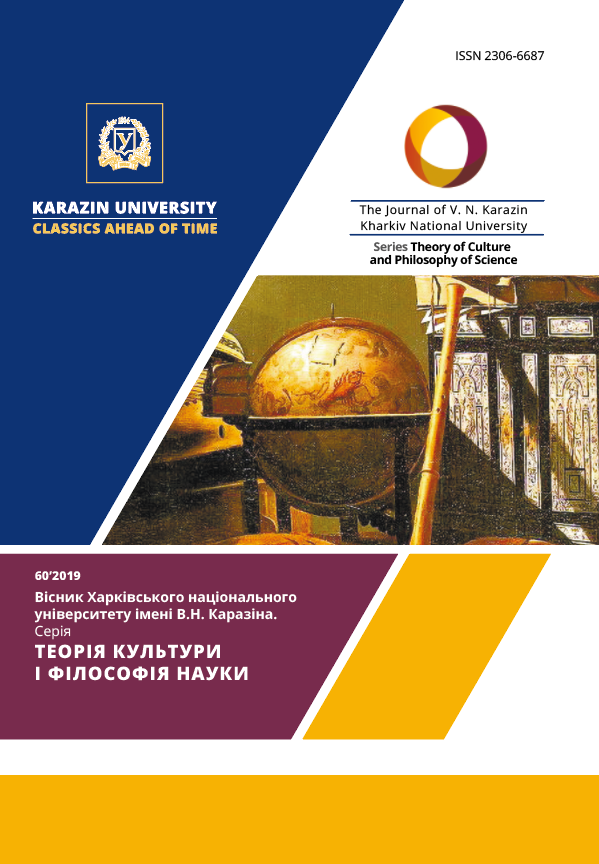Metaphor and concept as forms of transition from preconceptual thinking
Abstract
Metaphor acts as preconceptual knowledge to form a preconceptual form of thinking – a concept. Thus, one can construct such a link in the process of concept formation: metaphor – concept – notion. Fundamental discovery of j. Lakoff and m. Johnson was in the fact that they recognized the fundamental metaphoricity of human thinking, that is, metaphor can be called one of key mechanisms for formation of conceptual forms of thinking, and the world is the product of metaphorization. But in this case, metaphor in thinking and metaphor in language are different metaphors. Because of the fact that linguistic metaphor is easier to detect in “language material”, it is more often called just metaphor, but metaphor in thinking is a process we propose to call metaphoron, that is, the process of metaphorization, along with such means of cognition as comparison, analysis, and imagination (rational and irrational). Metaphoron as thinking mechanism allows to structurize abstract categories through images of objects which are sensually recognizable. With metaphor, one object is projected through the other.
Concept is an individual reflection of meanings, values, impressions, so emotions in the concept are also present. We can assume that concept is a "prototype" of notion, that is, concept was formed from many elements, among which most appropriate through logical rational operations (comparison, analysis) and irrational (e.g., imagination, intuition) were selected over time. Also, in this process, important role is played by the metaphorization process, which cannot be fully attributed either to logical operations, or to irrational ones, that is, metaphorization is on the border of rational and irrational, including elements of both operations. Concept is undoubtedly broader than notion and includes, in addition to abstract features, associative and emotional as well as sensory aspects. But it is pertinent to mention that, for example, emotional aspects make it difficult and unproductive to reach understanding with another person, so rational operations are appropriate for communication and language formation. However, emotions also require expression and can be expressed not the way animals do – via shouting or physical force, but through creativity - in songs, paintings, dances. With these types of self-expression, understanding also arises on sensual level, for example, if the song has major tone, everyone realizes that it is fun and vice versa with minor tone. When people begin to describe music in terms of concepts, abstract concepts are best suited, that is, in this case, metaphor (metaphorization process) does not perform function of categorization, that is, as a result, no new words are created, but a "repository" of feelings, a "preserved" feeling that is almost invariable passes on to the next generation. Thus, it can be concluded that, if language is used to convey experience in the form of information, then it is a metaphor to convey experience in the form of feelings.
It should be noted that in the process of cognition errors, illusions are possible, since the process of cognition is subjective, and metaphor as process and result testifies to it, that metaphorical creative language can convey any peculiarities of personal experience. The comparative and figurative conception can be criticized, because in the process of metaphorization not only comparison, but also analysis, selection of the main and secondary issues, intuition are involved. It is important to recognize that language changes over time, meanings of the words change, but to put it more precisely, the meaning changes partially. Thus, we can conclude that metaphor is not just a decoration of language, but a tool for formation and changing of language.
Downloads
References
Аскольдов С. А. Концепт и слово / С. А. Аскольдов // Русская словесность: От теории словесности к структуре текста: Антология / Под общ. ред. В. П. Нерознака. – М.: Academia, 1997. – С. 267-279
Ельчанинов В. А. Основные проблемы интернализма: монография / В. А. Ельчанинов; АлтГУ. – Барнаул: Изд-во АлтГУ, 2013. – 206 с.
Кузьмина Е. В. Концептуальная метафора как форма предпосылочного знания в современном естествознании: дис. … кандидата филос.наук : 09.00.01 / Кузьмина Елена Владиславовна. – Казань, 2019. – 142 с.
Лакофф Дж. Женщины, огонь и опасные вещи: Что категории языка говорят нам о мышлении. Книга 1: Разум вне машины / Дж. Лакофф; Пер. с англ. И. Б. Шатуновского. – М.: Гнозис, 2011. –С. 512.
Микешина Л. А. Философия науки: Современная эпистемология. Научное знание в динамике культуры. Методология научного исследования: учеб. пособие / Л. А. Микешина. – М.: Прогресс-Традиция: МПСИ: Флинта, 2005. – 464 с.
Пуанкаре А. О науке: Пер. с фр. / Под ред. Л. С. Понтрягина. – 2-е изд., стер. – М.: Наука. Главная редакция физико-математической литературы, 1983. – 736 с.
Решетникова Е. В. Метафора в постнеклассическом познании: монография / Е. В. Решетникова; Новосиб.гос. архитектур.-строит. ун-т (Сибстрин). – Новосибирск: НГАСУ, 2013. – 164 с.




